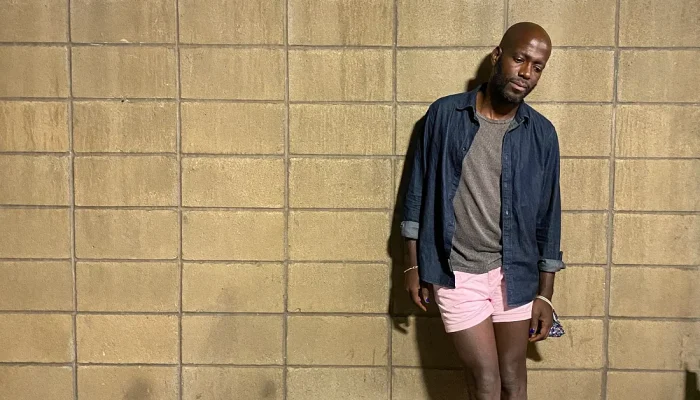Sonari Glinton doesn’t have too many rituals, before stepping into a recording studio — or more accurately, in these COVID times, his home recording closet. As he prepares to read through his script as host of Now, What’s Next, he might nosh on some green apple slices. It’s a well-known remedy to deal with mouth mucus or other — what’s termed in industry parlance as — mouth noises. But his main strategy is to keep well hydrated.
“Especially if it’s early in the morning, I usually like to drink hot water or tea. Besides that, my preparation is, you know, journalism. Knowing what I’m going to talk about. Being comfortable with the questions,” he says, with a chuckle.
A former reporter with NPR, and producer/director for the celebrated show, All Things Considered, Glinton has had some time to figure out his voice. He worked with and had a chance to closely observe some of the legends in the industry such as Robert Siegel, Michele Norris, and Melissa Block. The biggest lesson he learned from his mentors, as well as his personal pursuits, is to be himself.
“What’s my voice? I think I sound like who I am. A middle-aged, very GenX, urban, Black male. Gay male,” he says. He grew up the traditional Chicago way, he adds. And there were only a couple of career options plausible for a Catholic schoolboy in Chicago.
“You become a lawyer. You go into finance. Or…” he pauses, before breaking out in a laugh. “That’s about it.”
It so happens that Glinton ended up working at the Board of Trade in Chicago during the time of the first tech boom. Then 9/11 happened.
“I was working in the Sears Tower [now known as Willis Tower], and literally that day I thought: Wow. If a plane hit the building, would I be wanting to look at a spreadsheet,” he says.
When offered an option to move for work to Minnesota or taking a severance package, he chose the latter. He took time off to travel across Europe, volunteer at the local library, and eventually landed an internship with WBEZ.
During his time there, he covered Barack Obama’s senate campaign in Chicago, as well as the Rod Blagojevich corruption scandal, while reporting on local politics. He eventually joined NPR and Planet Money, covering the auto industry, the 2012 presidential race, and the Winter Olympics in Sochi.
When he got a chance to host his own show, he dipped into that extensive background as a reporter and a radio show director to take on the new role.
“Robert [Siegal] on air was not far away from the Robert who was [standing] two feet away from me … It was a realization that Robert was being his true self. At his best,” says Glinton. “Michele Norris could get people who had been trained by the media, I mean trained by professionals; she could get them to give up information by just being herself.”
At the same time, he doesn’t take himself too seriously, says Glinton. He doesn’t need to appear smart all the time, or overly serious. As the host, he does not need to prove himself to anyone. He uses some of that leeway to sometimes get a reaction or an emotion from his guest.
“It’s one of the tricks I learned as a reporter when I needed to get good tape,” he says. “Like if I ask someone, ‘Well, why does that matter,’ in a sort of a dismissive tone, the person could respond in outrage.”
At the same time, you want to be human and empathetic. After all, a host needs to actively listen to the guest and respond to them.
“As a host, you are passing out the hors d’oeuvres,” says Viki Merrick, an independent radio producer and voice coach for audio producers. “These are audio hor d’oeuvres. You’re about to introduce me to someone, you are telling me why we’re listening to them, and here we go!”
The most important thing to remember, she adds, is that hosts need to get that permission to be themselves.
“It’s like in the Wizard of Oz. You know when Oz gives courage to the lion and heart to the tin man. [As a host] you already have this stuff. But when someone says, ‘Ok, you’re the boss’ — you think, ‘Ok, I will be that person.”
If a host is experiencing a challenge — perhaps they sound aloof, or they might have issues with their cadence, or maybe they are over-confident — it’s best to listen to the show with someone the host trusts. Listening together to a show can help you hone in on those specific issues. You can also remind the host to treat the guest how they themselves would like to be treated, as human beings.
“Of course, you don’t want to mow your host down with criticism,” she says. “But you can point out, see how you sound like you are in the other room.”
The script that a host reads is also crucial, according to both Merrick and Glinton.
Sometimes it’s better to have bullet points instead of copy. That way the host has the important information at hand but can feel relaxed to add their own personality to the conversation, says Merrick.
“Write short, declarative sentences,” says Glinton. “I like to print out scripts because it’s easier to look at a whole piece of paper. I also like to follow my own curiosity.
“The one thing I mess up with all time is the length of the question. Long questions don’t get good answers. And if you ask three questions, you will get one answer. So keep it short.”
No matter how many tips or tricks you use, nothing beats preparation, says Merrick.
“I work with one of the most eloquent and articulate people—Jay Allison,” she says. “No matter what script we give him, he looks at all of it. It’s just respectful. Not only to your job as a host but also to the people you are talking to.”
Things for hosts to remember, before you step in front of the microphone:
- Read the script. Aloud. Read it at least once, if not several times. This will help you figure out words or turns of phrases you might trip on. It will also help your mouth get warmed up.
- Mind your P’s. Popping is one of the most annoying parts of voicing. Sometimes saying a tongue-twister full of p’s gets it out of your system. Try this one: Printed papers under pressure make pens prickle. There are plenty of other options just a web search away.
- Find your preferred stance. Some people like to stand and use their diaphragm. Some people prefer the intimacy of sitting down and leaning into the microphone. Figure out what works best for your voice.
- Eat a few green apple slices or sip on tea or warm, honey water — whatever works for you. But hydration is key, and a glass of water is often all you need.
If you enjoyed this article, you might like to read, “What Makes a Great Podcast Host: a Checklist for Brands.”
Sign up for the Pacific Content Newsletter: audio strategy, analysis, and insight in your inbox.





